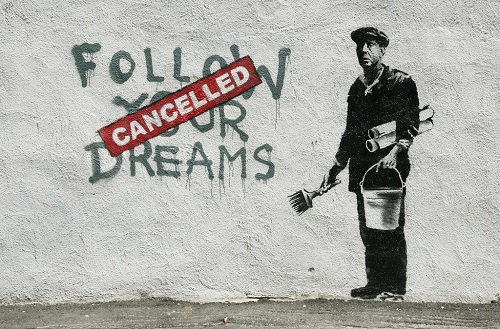flickr/Banksy
By
Tom Arms
The Beatles sang: “All you need is love”, and young girls delicately placed flowers in the barrels of the guns of National Guardsmen. For a brief period in the 1960s and 1970s we thought that love would emerge as the world’s overpowering human emotion. That the words of Franklin Roosevelt—“all we have to fear is fear itself”– would pass into historical redundancy. And that Senator McCarthy’s commies under the bed witch hunt was an uncharacteristic historical blip.
Sorry, it was not to be. Fear is once again the overriding political emotion which is driving the thinking of the electorate and being ruthlessly exploited by the politicians. In Britain, fear of immigrants, sovereignty and a loss of national identity drove people to vote for Brexit. Conversely, it is a fear of financial loss and political influence which is driving the Remain camp to continue opposing Brexit. The country is hopelessly divided because both sides are terrified of the consequences of losing the argument.
In the United States Trump supporters are frightened of “invading” Mexicans who will take their jobs, destroy their identity, rape their women, force them to smoke, swallow and inject drugs and murder them in their beds. The “invaders” from Mexico and Central America are frightened because they are being murdered in their beds, and on the streets, by gangs fighting each other for control of the lucrative drug trade into America.
Trump supporters are also scared of the Chinese, globalism, socialism, liberalism and the growing power of their own government. Opponents of Donald Trump are frightened of Trump. Almost everyone except Trump is frightened of climate change.
The Nazi ghosts of Germany’s past continue to haunt the Germans in the form of Pegida and the Alternative fur Deutschland, who in turn are worried about what they perceive as the growing Islamisation of their country. Hungary’s Viktor Orban and Italy’s Matteo Salvini make no secret of their intention to play on their countrymen’s xenophobia to stay in power. Putin’s Russia uses fear of NATO and the West to create a bogeyman for the electorate, as do the Mullahs of Iran. The Saudis fear the Iranians. The Turks are frightened of the Kurds and vice versa. The Palestinians fear and hate the Israelis and Israel is frightened that just about everyone except Donald Trump wants them either removed from the political scene or forced into a compromise with the hateful Palestinians.
North Korean’s Kim Jong-un is frightened that if he doesn’t retain nuclear weapons then his regime will fall victim to the bright lights of South Korea. The Chinese leadership are worried that failure to maintain a high growth rate will spell the end of party rule and Chinese dissidents are terrified of party rule. Just about every dictator everywhere is concerned that they will wake up the following morning in prison or swinging from a lamppost. And the same fear is shared by almost every citizen of every dictatorship.
In many respects the power of fear is understandable and natural. As humans we are born crying, because we’re suddenly exposed to something that hurts. It’s instinctive. We’re helpless, and at birth we have the first taste of the fear of pain and death.
As we age, we face new fears: Parental disapproval, lack of peer respect, academic and sporting failure, the terrifying prospect of being alone and unloved, rejection, career failure, disease, and finally, death. In fact, we are all terrified of the unpalatable truism: Life’s a bitch and then you die.
Fear of death has spawned a multitude of religions, but none of them have ever successfully erased the instinct that we share with every other animal on planet Earth.
Like all instincts, there is a reason for being frightened of fear. Fear of death helps to keep us alive by driving us to cling to life. In the political sphere, fear turns couch potatoes into voters and even political activists. It can be a force for positive change as well as a debilitating terror. But for fear to become a political building block rather than a dangerously divisive wrecking ball, it must be tempered with reason and Pandora’s butterfly of hope.
Tom Arms
I am a journalist, entrepreneur and historian with extensive experience in print, web and broadcast journalism. I started as a diplomatic correspondent, wrote several books (The Falklands Crisis, World Elections On File and the Encyclopedia of the Cold War), and then in 1987 started my own business (Future Events News Service, www.fensinformation.com) which over 25 years established itself as the world and UK media’s diary. Our strapline was: “We set the world’s news agenda.” I sold FENS in December 2012 but retained the exclusive broadcast rights to all of FENS data. To exploit these rights I set up LookAhead TV which produces unique programmes which “Broadcasts Tomorrow Today” so that viewers can “Plan to Participate.” LookAhead has appeared regularly on Vox Africa, Radio Tatras International, The Conversation and Voice of Africa Radio.
In addition to being a syndicated broadcaster and columnist on global affairs, Tom is also available for speaking engagements and can be contacted on Twitter, Linkedin and email: tom.arms@lookaheadnews.com



No Comments Yet!
You can be first to comment this post!